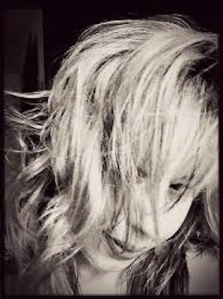 Helen Vitoria is a poet and an artist living in Pennsylvania. Her poems and photographs appear widely online and in print. She is the author of nine poetry chapbooks, a poetry pamphlet, a full length poetry collection and a collaborative ekphrastic poetry/photography collection. Her poems have been nominated thrice for Best New Poets & several Pushcart Prizes. She is the Founding Editor & Editor in Chief of Thrush Poetry Journal and Thrush Press. She also served as a Poetry Editor for Poets & Artists Magazine. She teaches a free monthly poetry workshop in her community and will be teaching poetry to inmates in Pennsylvania Corrections Facilities. She is working on her second collection of poetry.
Helen Vitoria is a poet and an artist living in Pennsylvania. Her poems and photographs appear widely online and in print. She is the author of nine poetry chapbooks, a poetry pamphlet, a full length poetry collection and a collaborative ekphrastic poetry/photography collection. Her poems have been nominated thrice for Best New Poets & several Pushcart Prizes. She is the Founding Editor & Editor in Chief of Thrush Poetry Journal and Thrush Press. She also served as a Poetry Editor for Poets & Artists Magazine. She teaches a free monthly poetry workshop in her community and will be teaching poetry to inmates in Pennsylvania Corrections Facilities. She is working on her second collection of poetry.
TCJWW: Corn Exchange begins with a quote from an Anne Sexton poem. She then shows up several times in your collection. How did her work inspire these poems? What other poets were you reading while writing these poems?
Vitoria: Anne Sexton has influenced my writing well before this collection was written, and will probably always do so. I read a tremendous amount of poetry, it’s hard to pinpoint who influences me, and at what point. I am also influenced by music a great deal as well as my natural environment. The mountains inspire me to write and to let my imagination go into new directions. Corn Exchange was written over several years, with no particular “finish” date in mind.
TCJWW: How did you choose the title for this collection? How do all the poems come together as an exchange?
Vitoria: The title is mostly explained in the poem “Freddy,” feeding the dog corn through the fence… the exchange of corn became symbolic of trust, of kindness, something unspoken between two beings. At some point it seemed to make sense that the title would fit the book.
TCJWW: Throughout Corn Exchange, the mine fire of Centralia, PA burns underground—as mythic and metaphorical as it is real, almost a Hades to the world of these poems. What does this image of fire underground mean to you?
Vitoria: Many things—The classic hell of course is the obvious metaphor, but it is not just the hell of myth. It can be the hell that others impose on you that control your emotions and keep you from emerging and being your own person. It can be the hell that a person puts on themselves, an internal mechanism that tries to bury the self. I think many of my poems are about delving into those hells, and the struggle to escape. The obvious: there are many things going on below the surface.
TCJWW: Similarly, images of yellow (goldenrod, canaries, corn) tie these poems together. What does the color yellow mean to you as a poet? What does it mean to this collection?
Vitoria: To me, yellow is the center, before one reaches any sign of relief, of hope, and possibility.
TCJWW: Some poems in Corn Exchange are blocks of prose (like the poem “In Fields”) and some have very short, even single-word lines (like the poem “Girl”). What is your process of deciding how to break the lines of a poem (or not)?
Vitoria: I write the words first, without any regard to form. I feel this frees me of any restraints on what I want to say by having to fit the words to a pre-ordained shape. A poem might be generated by a line that comes to me while just getting through the day and it won’t necessarily be the first line. Once I have the words done, and edited, the poem almost decides for itself what form it will take. Once it has taken form, I do very little, if any, editing.
TCJWW: As an editor of Thrush (one of the “Top 10 Lit Mags to Send Your Very Best Poetry (and get happily rejected)”), what do you look for in a poem?
Vitoria: Difficult question—I do not read looking for anything specific. I read poetry daily, and have done so for years, from classic to modern day cutting edge. I feel this has given me an innate sense of what is good writing. Most important is I want the poets to make me feel; feel what they are trying to get across. Thrush features a full range of styles and subject matter. At a certain point in reading a poem I will know if this is for me and Thrush. I want the poem to stay with me long after the reading. I look for voice that is fresh in language and delivery.

Pingback: » The Community Roundup: February 26, 2014·